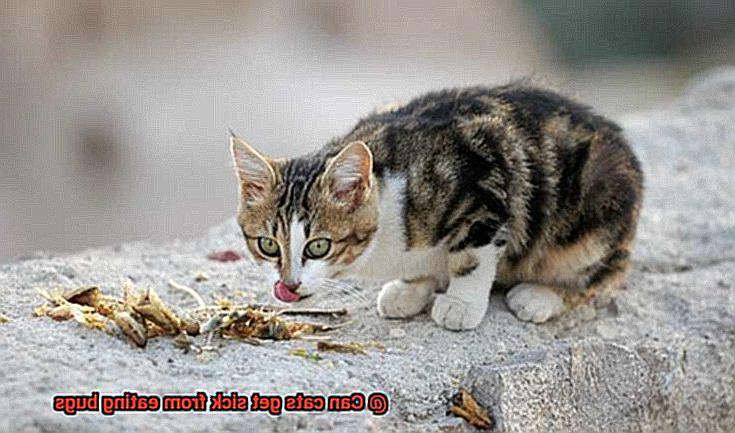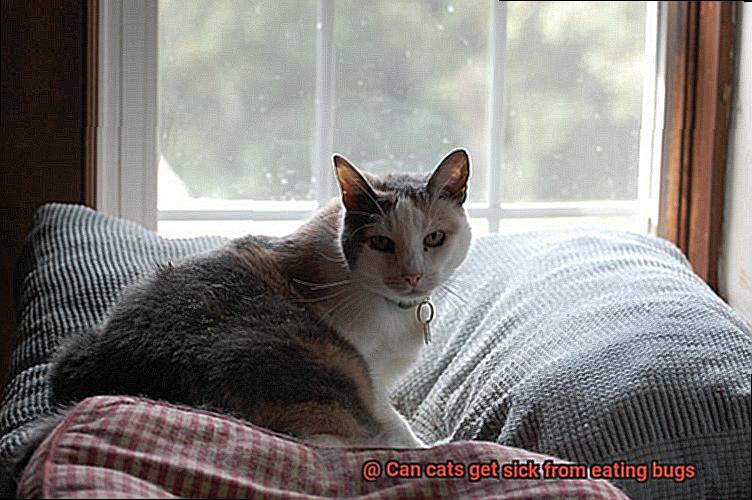Do you ever catch your curious cat nibbling on bugs, like flies, moths, or spiders? As a cat owner, it’s natural to wonder if your feline friend might get sick from chowing down on these creepy crawlies. Luckily, as an expert in feline health, I’m here to help you sort fact from fiction.
First things first: not all bugs are created equal. While some insects can provide a protein boost to your kitty’s diet, others can carry harmful parasites or toxins that could make them ill. For example, mosquitoes can transmit heartworm larvae to cats which can be deadly if left untreated. Certain species of spiders and caterpillars may also cause allergic reactions or toxicity when consumed.
But don’t fret. There are ways to protect your furry pal from the dangers of bug-eating. Keeping your home clean and free of insect infestations is key. You might also consider using pet-safe insect repellents or sprays to keep bugs at bay in your cat’s living areas.
So next time you spot your kitty snacking on a bug, take note of what kind of critter it is and take appropriate action to keep them healthy and happy. With a little vigilance and care, you can minimize the risk of your cat getting sick from eating bugs.
Types of Bugs Cats Eat
As natural hunters, cats have a strong instinct to chase and eat bugs. While some may prefer larger prey, such as birds or rodents, others may be content with insects. However, not all bugs are created equal when it comes to their safety for cats. In this article, we explore the different types of bugs that cats may eat and the potential risks associated with them.
Grasshoppers, Crickets, and Beetles
Many cats enjoy hunting and eating insects such as grasshoppers, crickets, and beetles. These bugs are generally harmless to cats and can provide a good source of protein. However, it is crucial to ensure that the insect has not been exposed to any harmful chemicals or pesticides. Otherwise, your cat may ingest these toxins and become sick.
Spiders
Cats may also eat spiders, which are generally harmless to them. In fact, some species of spiders are beneficial for cats to consume as they contain high levels of protein. However, owners should be cautious about their cats ingesting venomous spiders such as black widows or brown recluse spiders. If your cat consumes a venomous spider, they may experience symptoms such as vomiting or diarrhea.

Flies and Moths
Cats may consume flies and moths, which are generally considered safe for them to eat. However, these insects may have come into contact with pesticides or other chemicals that can be harmful to your cat if ingested. Additionally, ingesting large amounts of moths can lead to an upset stomach or even vomiting.
Cockroaches and Other Household Pests
Some cats may even eat cockroaches or other household pests. While these bugs are not toxic to cats, they can carry diseases and parasites that can make your cat sick. If your cat consumes an infected bug, they may develop illnesses such as salmonella or tapeworms.

Potential Risks Associated with Eating Bugs
The dangers of bugs vary depending on the region you live in. In areas with a high population of disease-carrying insects, such as ticks or mosquitoes, your cat may be at higher risk for contracting illnesses. Additionally, some cats may have an allergic reaction to certain bugs, which can lead to health problems such as anaphylaxis.
To prevent your cat from getting sick from eating bugs, it is important to keep them indoors as much as possible and monitor their outdoor activities closely. Regularly check your cat for fleas and ticks, and consult with your veterinarian about preventative measures.
What Are the Potential Risks of Eating Bugs?
While it may seem like harmless fun, there are potential risks associated with cats consuming insects.
Toxicity is one of the main concerns when it comes to cats eating bugs. While most bugs are harmless, some species can be toxic and cause a range of symptoms, including vomiting, diarrhea, lethargy, seizures, or even death. For example, the black widow or brown recluse spider can be deadly if ingested by your cat. Therefore, it’s essential to keep an eye on your cat’s bug-eating habits and make sure they’re not consuming anything dangerous.

Intestinal blockage is another risk of cats eating bugs, especially those with hard exoskeletons like beetles or grasshoppers. These exoskeletons can become lodged in their digestive tract, leading to discomfort and potentially serious health issues if left untreated. It’s best to take your cat to the vet immediately if you notice any changes in their appetite or bowel movements after they’ve eaten bugs.
Certain bugs can also transmit diseases to cats through bites. Ticks, fleas, and mosquitoes are known carriers of diseases like Lyme disease, bartonellosis, and heartworm. If your cat consumes a bug infected with one of these diseases, they may become sick and require medical treatment.
How to Identify Dangerous Bugs
While some insects may be harmless, others can cause severe health problems for your pet. Here are five sub-sections that explain how to identify dangerous bugs that pose a threat to your cat’s well-being.
Beware of Stinging Insects
Stinging insects such as bees, wasps, and hornets can cause pain, swelling, and even anaphylactic shock in severe cases. If you spot these insects around your home or yard, be sure to keep a close eye on your cat and try to keep them away from the area. It is essential to be aware of wasp nests and bee hives in the vicinity of your home as well.
Be Cautious of Spiders
Although most spiders are harmless to cats, certain species can be poisonous. The black widow spider and brown recluse spider are two of the most dangerous spiders in North America. If you notice these spiders in or around your home, take necessary steps to eliminate them or call a professional exterminator.
Check Your Cat for Ticks

Ticks can carry diseases such as Lyme disease and Rocky Mountain spotted fever, which can be harmful to both cats and humans. Make sure to check your cat regularly for ticks, especially if they spend time outside in wooded areas.

Be Careful of Caterpillars
Some caterpillars have spines or hairs that can cause skin irritation or even allergic reactions in cats. The puss caterpillar is one example of a dangerous caterpillar that can cause severe pain and swelling. Keep an eye out for caterpillars in your yard and discourage your cat from playing with them.
Fireflies Can Be Harmful
While fireflies themselves are not dangerous to cats, the chemicals they produce can be toxic if ingested in large amounts. If your cat likes to chase and eat fireflies, try to discourage this behavior or supervise them closely.
The Danger of Parasites in Bugs
However, this seemingly harmless behavior can actually put your cat’s health at risk due to the danger of parasites found in bugs.
Parasites are living organisms that thrive on or inside another organism, known as the host. Bugs are notorious for carrying parasites such as fleas, ticks, and worms, which can lead to a range of health issues for your cat.
Fleas are particularly concerning as they can quickly take over your cat’s skin and fur, leading to intense itching, hair loss, and even anemia. These pesky parasites can also carry tapeworm larvae, which can infect your cat’s intestines if they ingest the flea while grooming themselves.
Ticks are another type of parasite that pose a significant threat. These blood-sucking bugs can transmit diseases such as Lyme disease and Rocky Mountain spotted fever to your cat. Even coming into contact with a tick can be dangerous to your furry friend.
Worms are yet another type of parasite that cats can contract from eating infected bugs. These worms can cause digestive issues, weight loss, and other health problems.
It’s essential to understand that even if your cat doesn’t directly eat a bug, they can still be at risk of contracting parasites if they come into contact with bugs or their feces. For example, if your cat sniffs around an area where fleas have been or eats a mouse that has been feeding on insects, they run the risk of ingesting fleas or tapeworm larvae.
To protect your cat from these dangers, it’s crucial to take preventative measures such as regularly treating them for fleas and ticks. Monitoring their behavior when outside is also necessary to ensure they aren’t eating any bugs that could put their health at risk. If you suspect that your cat may have ingested a bug carrying parasites, it’s essential to seek veterinary care immediately to prevent any potential health issues.

Preventative Measures To Take
One way to do so is by taking preventative measures to prevent them from eating bugs. While bugs may seem like a harmless snack, they can carry parasites that can lead to serious health issues. Here are some tips on how to keep your cat from eating bugs:
Cleanliness is key when it comes to preventing bugs. Make sure to regularly clean and vacuum your home, paying special attention to areas where bugs may be more prevalent. Sealing any cracks or holes in walls or doors can also prevent bugs from entering your home. Additionally, using insecticides or bug traps can help eliminate any bugs that may be lurking around.
Your cat’s food and water bowls should also be kept clean and free from any bugs or debris. Leaving food out for extended periods of time can attract bugs, so feeding your cat smaller portions throughout the day instead of leaving a large bowl of food out all day is recommended.

If you notice your cat has ingested a bug, it’s important to monitor them closely for any signs of illness. Symptoms may include vomiting, diarrhea, lethargy, loss of appetite, and dehydration. If you notice any of these symptoms, contact your veterinarian immediately.
Providing your cat with appropriate toys and distractions can also prevent them from turning to bugs as a source of entertainment. Toys that involve hunting and chasing can satisfy your cat’s natural instincts without resorting to eating bugs.
Signs and Symptoms of Illness After Eating Bugs
While it may seem like a harmless indulgence, cats eating bugs can actually lead to serious health issues. As an expert on the signs and symptoms of illness after eating bugs, let me tell you what to look out for.
First on the list of symptoms is vomiting. Toxins in the bug could irritate your cat’s stomach lining, leading to frequent vomiting. Additionally, some bugs carry harmful bacteria or parasites that can cause gastrointestinal issues. If your cat starts to vomit after indulging in a bug feast, it’s time to call the vet.
Diarrhea is another possible symptom. Ingesting a bug carrying harmful bacteria could cause your cat to experience unusual bowel movements accompanied by blood or mucus. Keep an eye out for any concerning signs and contact your vet if anything seems off.
Lethargy or weakness is also something to watch out for after your cat eats bugs. Some insects contain toxins that can affect a cat’s nervous system, leading to a tired or weak kitty. If this happens, don’t hesitate to seek veterinary care.
Allergic reactions are yet another possible outcome when cats eat bugs. This might manifest as itching, swelling, or hives. These symptoms can be severe and require immediate veterinary care.
Allergies to Certain Insects
However, not all insects are created equal, and some can lead to serious health problems for your furry companion.
One of the most common culprits of allergic reactions in cats is the mosquito. Their bites can cause a condition called eosinophilic granuloma complex, characterized by skin lesions and ulcers. It’s important to keep an eye on your cat outdoors and prevent them from getting bitten.
Bees are also a danger to cats. If your cat ingests a bee, it can lead to swelling, difficulty breathing, and even death in severe cases. It’s essential to monitor your pet when they’re outside and prevent them from eating any stinging insects.
Fleas are another common cause of allergies in cats. Ingesting fleas while grooming can cause intense itching, redness, and hair loss. If you notice these symptoms in your cat, it’s crucial to seek veterinary assistance immediately.

Symptoms of an allergic reaction can vary, but common signs include vomiting, diarrhea, lethargy, itching, swelling, or difficulty breathing. If you suspect your cat is having an allergic reaction, don’t wait to seek veterinary care.
Your veterinarian may recommend antihistamines or other medications to relieve symptoms and prevent further complications. By being vigilant and seeking prompt veterinary assistance, you can help ensure your cat’s health and well-being.
Keeping Cats Safe From Harmful Insects
However, this curiosity can sometimes lead to trouble when they come into contact with insects. While some insects are harmless to cats, others can pose serious risks and even be deadly. Therefore, it’s crucial to take steps to keep our cats safe from harmful insects.
Spiders are one of the most common insects that cats may encounter. Although most spider bites are harmless, there are a few species, such as the black widow and brown recluse spider, that can cause severe harm if they bite your cat. Symptoms can include swelling, pain, vomiting, and difficulty breathing. To avoid your cat coming into contact with these dangerous spiders, it’s vital to keep your home clean and free from spider infestations.
Bees are another hazard for cats. Bees are attracted to flowers and sweet smells, which means that when your cat is outside in your garden or on a walk, they may come into contact with a bee. Bee stings can be painful and cause swelling at the site of the sting. In some cases, a cat may have an allergic reaction to a bee sting, which can be life-threatening. To prevent bee stings, always check for potential hazards such as beehives before letting your cat outside. You may also want to consider using insect repellents that are safe for cats.
Ants are yet another insect that can pose risks to cats. Some species of ants, such as fire ants, can deliver painful bites or stings that can cause discomfort and swelling. If your cat ingests ants, it can also cause digestive problems such as vomiting and diarrhea. To prevent your cat from ingesting ants or getting bitten or stung by them, make sure to regularly clean up any food spills or crumbs around your home and check for ant hills in your outdoor space before letting your cat outside.
5ov14xKyqOI” >
Conclusion
In conclusion, while cats are natural hunters and may find bugs to be a tempting snack, not all insects are safe for feline consumption. Some bugs can carry harmful parasites or toxins that could make your furry friend seriously ill. For example, mosquitoes can transmit heartworm larvae to cats, while certain species of spiders and caterpillars may cause allergic reactions or toxicity when consumed.
To safeguard your cat’s health from the hazards of bug-eating, it’s crucial to maintain a clean home environment free of insect infestations. You might also consider using pet-safe insect repellents or sprays to keep bugs at bay in your cat’s living areas. Additionally, regularly checking your cat for fleas and ticks and consulting with your veterinarian about preventative measures is essential.
If you suspect that your cat has ingested a bug carrying parasites or harmful toxins, it’s vital to seek veterinary care immediately. Prompt action can prevent any potential health issues from becoming more severe. By being vigilant and taking appropriate measures to keep them healthy and happy, you can minimize the risk of your cat getting sick from eating bugs.
Remember that prevention is always better than cure when it comes to keeping our furry friends safe from harm. So next time you see your kitty eyeing up a bug buffet, take steps to protect them from the dangers lurking beneath those creepy crawlies’ shells.

